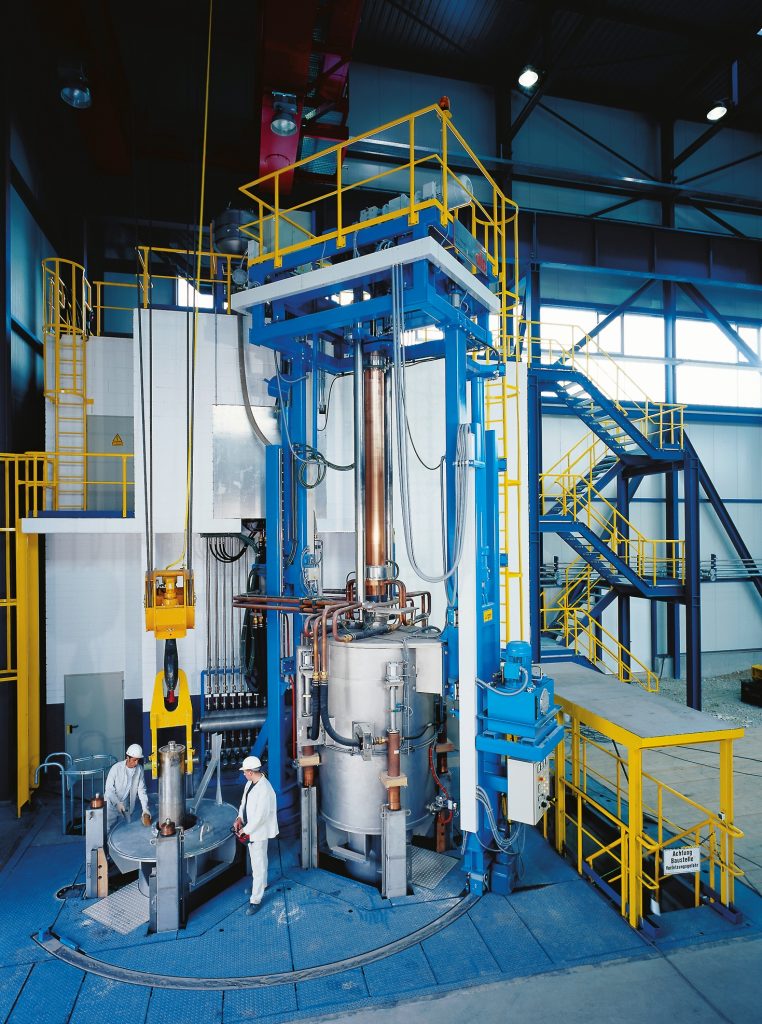ESR – Electro Slag Remelting
ESR Electroslag Remelting has been known since the 1930s, but it took approximately 30 years before it became an acknowledged process for mass production of high-quality ingots. The ESR technology is of interest not only for the production of smaller weight ingots of tool steels and superalloys, but also of heavy forging ingots up to raw ingot weights above 150 tons.

Electro Slag Remelting Furnace (ESR)
- The labory ESR Furnace is primarily used to produce small ingots with a maximum mold diameter up to
240 mm for and 500 kg ingot weight - Ingot diameters from 250 mm up to 2.300 mm are realized, offering ingot weights above 150 tons
- ESR furnaces can be designed for remelting of round, square and rectangular (slab) ingots
ESR Features
- Homogeneous, sound and directionally solidified structure
- High degree of cleanliness
- Free of internal flaws (e. g. hydrogen flakes)
- Free of macro-segregation
- Smooth ingot surface resulting in a high ingot yield
In the ESR-process a consumable electrode is dipped into a superheated slag pool surrounded by a water-cooled mold.
Electric current (usually AC) passes through the slag, between the electrode and the ingot being formed, and superheats the slag so that drops of metal are melted from the electrode passing through the slag to the bottom of the water-cooled mold and collect into the melt pool in solidification. The slag pool is displaced upwards as the ingot forms. The new ingot of refined material builds up slowly from the bottom of the mold. Such a homogeneous, directionally solidified ESR ingot will be formed, free from central void spaces and other defects typically occurring in conventionally cast ingots.
The ESR process offers very high, consistent and predictable product quality. Finely controlled solidification improves soundness and structural integrity.
ESR is recognized as the preferred production method for high-performance alloys that are used today in industries such as aerospace and nuclear engineering as well as for heavy forgings.
Today´s computer controlled process automation allows automated process control featuring reproducible material quality. Important to mention here is ALD’s unique electrode immersion depth control and power based melt rate control.
It can be stated that ALD’s ESR automatic melt control system (AMC) is unsurpassed in the world for its inherent features, ease of operation and last but not least its accuracy and repeatability of control, producing ingots with excellent properties.
ESR Applications
- Tool steels for milling cutters, mining, etc.
- Die steels for the glass, plastics and automotive industries
- Ball-bearing steels
- Steels for turbine and generator shafts
- Superalloys for aerospace and power turbines
- Nickel-base alloys for the chemical industry
- Cold rolls
- High nitrogen steels
Furnace Types
Multiple Purpose Laboratory Remelting System
This laboratory system combines VAR, ESR, PESR, IESR and VESR in one furnace. Different remelting processes can be carried out in one chamber type furnace using alternating or direct current to remelt one consumable electrode into one ingot, above (up to 70 bar) or below atmospheric pressure.
Single furnace head with two stationary mold systems
With two fixed remelting stations and one pivoting furnace head. These are particularly suited for efficient production at high production rates.
ALD’s furnaces are generally capable for remelting under inert gas atmosphere
Furnace with Ingot Withdrawal Systems
With a central ingot withdrawal station and electrode exchange capability, and an option with outer stations for remelting in stationary molds. The central station is particularly suited for remelting of large diameter ingots. Smaller diameter ingots may be remelted simultaneously in the outer stations.
Furnace suitable for melting under Pressurized or Vacuum Atmosphere
Completely sealed systems for ESR operations under vacuum, inert gas, or increased pressure. These systems are particularly suited for producing ESR ingots with high contents of nitrogen or reactive elements.
Contact
Mr. Stefan Lemke
T: +49 6181 307 3441
E: Stefan.Lemke@ald-vt.de
Mr. Ulrich Biebricher
T: +49 6181 307 3078,
E: Ulrich.Biebricher@ald-vt.de
Mr. Thomas Kilzer
T: +49 6181 307 3243
E: Thomas.Kilzer@ald-vt.de

